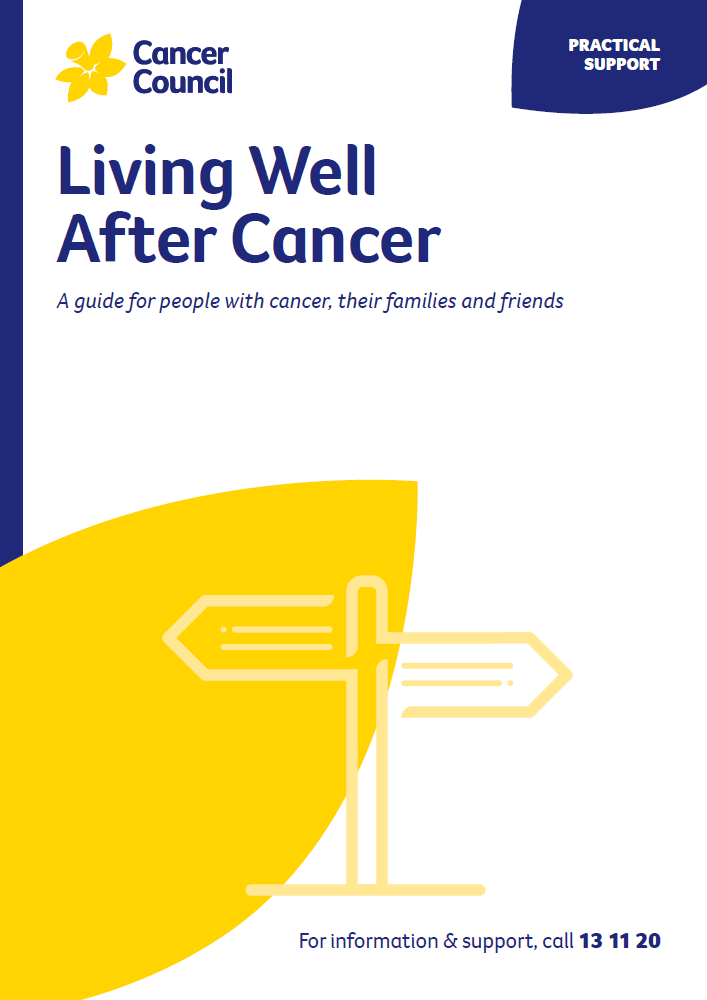- Home
- About Cancer
- Living well
- Living well after cancer
- Fear of the cancer returning
Fear of the cancer returning
It is common to feel anxious or frightened about the cancer coming back (recurrence). Most cancer survivors are likely to experience this fear to some degree, and it may come and go for many years. You can learn ways to manage this fear.
Learn more about:
- Overview
- Ways to manage the fear of recurrence
- Will the cancer come back?
- Survival statistics
- Fear of getting a different cancer
- Checking for signs of a new cancer
Overview
Worrying about recurrence may affect your physical wellbeing, as well as your ability to enjoy life and make plans for the future. Some survivors describe it as a dark cloud or a shadow over their life.
Over time, this fear usually fades, but it can return at certain times, such as:
- before follow-up appointments, tests and scans
- special occasions, such as birthdays or holidays
- anniversaries of the date you were diagnosed, had surgery or finished treatment
- when other people are diagnosed with cancer
- when you are feeling unwell or have symptoms similar to those when you were first diagnosed
- the death of a friend or family member
- passing by the hospital where you had treatment, or visiting someone in the same hospital
- hearing media reports about cancer, new treatments and celebrities with cancer
- seeing cancer-related fundraising campaigns or advertisements.
→ READ MORE: Managing the fear of recurrence
It helps to focus on what is happening now, what is actually known – not all the possibilities. One step at a time.
Jane
Podcast: Managing Fear
Listen to more episodes from our podcast for people affected by cancer
More resources
Prof Michael Jefford, Medical Oncologist and Director, Australian Cancer Survivorship Centre, Peter MacCallum Cancer Centre, VIC (clinical review); Lucy Bailey, Nurse Counsellor, Cancer Council Queensland; Philip Bullas, Consumer; Dr Kate Gunn, Clinical Psychologist and Senior Research Fellow, Department of Rural Health, University of South Australia, SA; Rosemerry Hodgkin, 13 11 20 Consultant, Cancer Council WA; Prof David Joske, Clinical Haematologist, Sir Charles Gairdner Hospital and Clinical Professor of Medicine, The University of Western Australia, WA; Kim Kerin-Ayres, Clinical Nurse Consultant, Cancer Survivorship, Concord Hospital, NSW; Sally Littlewood, Physiotherapist, Seymour Health, VIC; Georgina Lohse, Social Worker, GV Health, VIC; Melanie Moore, Exercise Physiologist and Clinical Supervisor, University of Canberra Cancer Wellness Clinic, ACT; June Savva, Senior Clinician Dietitian, Nutrition and Dietetics, Monash Cancer Centre, Monash Health, VIC; Dr Elysia Thornton-Benko, Specialist General Practitioner and Research Fellow, University of New South Wales, NSW; Prof Janette Vardy, Medical Oncologist, Concord Cancer Centre and Professor of Cancer Medicine, The University of Sydney, NSW; Lyndell Wills, Consumer.
View the Cancer Council NSW editorial policy.
View all publications or call 13 11 20 for free printed copies.

